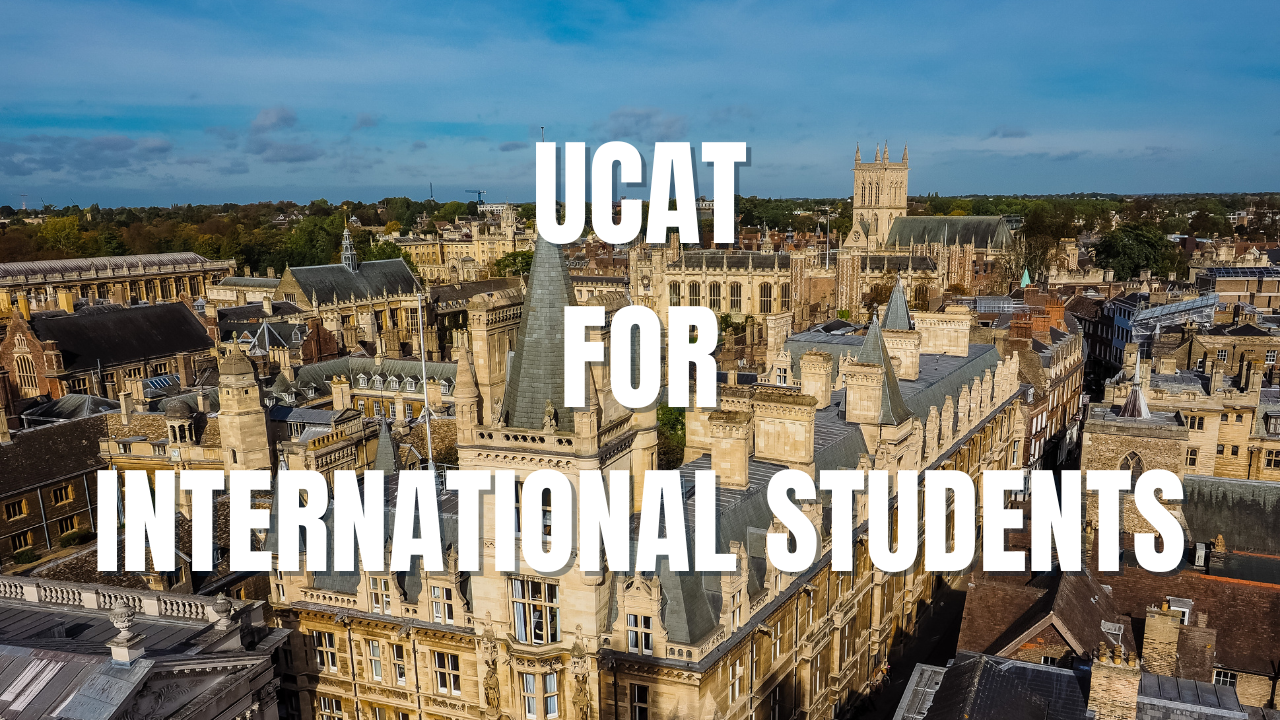
Every year, thousands of brilliant international students miss out on UK medical school places—not because they lack ability, but because they don’t understand how the competition differs for overseas applicants. With only 500 medical school places available for international students compared to 7,100 for UK students, the stakes couldn’t be higher.
If you’re an international student dreaming of studying medicine in the UK, you’re facing unique challenges that domestic students simply don’t encounter. From understanding visa requirements to knowing which universities actually welcome international applicants, the path forward can feel overwhelming.
The Reality Check
UCAT requirements vary dramatically by university – from 2,440 at Aberdeen to 2,940 at Bristol. The UK average UCAT score in 2024 was 2,523, but international students need strategic university selection to maximise their chances.
2024 UCAT Cut-off Scores
Feeling Overwhelmed by the Complexity?
Our UCAT specialists help international students navigate every aspect of UK medical school applications.
Which UK Medical Schools Actually Accept International Students?
Here’s what most international students don’t realise: not all UK medical schools approach international admissions equally. While all UK medical schools technically accept international applications, the practical reality varies dramatically.
Medical Schools with Higher International Acceptance Rates
Queen’s University Belfast
38.3% acceptance rate – Strong international community and supportive admissions process
Brighton & Sussex Medical School
37.7% acceptance rate – Explicitly welcomes diverse international cohorts
University of Newcastle
30%+ acceptance rate – Large cohorts with good international support
University of East Anglia
30%+ acceptance rate – Particularly supportive of international applications
More Competitive Options (But Still Possible)
Universities with International Quotas:
- Cardiff Medical School: 7.5% cap on overseas places (approximately 25 places in year 1)
- Oxford and Cambridge: Extremely limited international places
- Imperial College London: Very competitive international admission rates
What UCAT Scores Do International Students Actually Need?
Based on verified 2024 admissions data, here are the real UCAT score requirements for international students:
2024 UCAT Cut-off Scores by University
Lower Requirements
- Aberdeen: 2,440
- Glasgow: 2,450
- Edinburgh: 2,470
Higher Requirements
- Bristol: 2,940
- Birmingham: 2,670+ for interviews
Key Insight: The average UCAT score in 2024 was 2,523. Requirements vary significantly – strategic university selection is crucial for international students.
The True Cost of Studying Medicine in the UK as an International Student
Before you commit to this journey, you need to understand the financial requirements. UK visa applications require you to prove you can finance these costs upfront:
Verified Cost Information
Annual Tuition Fees
£43,700 – £70,554
Cardiff (lowest) to Cambridge (highest + college fees)
Student Visa
£490
One-time application fee
Health Surcharge
£776 per year
Immigration Health Surcharge (mandatory)
Additional Costs
Variable
Living expenses, accommodation, course materials
Important Note: You must prove financial capacity for at least one academic year upfront as part of your visa application. Living costs vary significantly by location, with London being considerably more expensive than other UK cities.
Critical Mistakes International Students Make (And How to Avoid Them)
Mistake 1: Underestimating the Competition
Many international students apply with the same approach as domestic students, not realising they’re competing for dramatically fewer places. With only 500 international places versus 7,100 for UK students, your strategy must be different.
Mistake 2: Poor University Selection
Applying to the most famous medical schools without researching which ones actively welcome international students. Oxford and Cambridge, for instance, have extremely limited international places.
Mistake 3: Inadequate UCAT Preparation
International students often have less experience with UK-style standardised testing. The UCAT includes scenarios with UK healthcare contexts that may be unfamiliar.
Mistake 4: Missing Visa Deadlines
Underestimating the time needed for visa applications. You can apply up to 3 months before your course starts, but processing times vary by country.
How Professional UCAT Support Transforms International Applications
Time Zone Flexibility
Access world-class tutoring regardless of your global location through online sessions.
UK Context Training
Learn to navigate UK-specific healthcare scenarios and cultural references in UCAT questions.
Strategic University Selection
Expert guidance on which medical schools offer the best opportunities for international students.
Proven Expertise
Our tutors have guided students from diverse international backgrounds to achieve competitive UCAT scores.
Meet Our Expert UCAT Tutors

Finlay
Medicine at Oxford
Currently studying Medicine at Oxford, where he graduated with First Class BA in Medical Sciences, placing 12th in his year. Specialist in UCAT preparation and medical school interview coaching for competitive universities.

Morgan
Chemistry at Oxford
Studying MChem at Oxford (Jesus College) with First Class Honours and academic scholarship. Expert in preparing students for medical school applications and Oxbridge interviews with over four years of tutoring experience.
Your Strategic UCAT Timeline as an International Student
Strategic Preparation Timeline
Early Planning Phase
Research medical schools, understand entry requirements, begin gathering work experience documentation.
UCAT Preparation Phase
Begin UCAT preparation, take diagnostic tests, book test centre early (recommended for popular locations).
Test and Application Phase
Intensive UCAT preparation, sit the test, complete UCAS application by October deadline.
Interview and Visa Phase
Prepare for interviews, begin visa preparation if successful with applications.
Frequently Asked Questions
What UCAT score do international students need for 2025?
UCAT requirements vary significantly by university. Based on 2024 data: Aberdeen (2,440), Glasgow (2,450), and Edinburgh (2,470) have lower requirements, while Bristol requires 2,940 and Birmingham 2,670+ for interviews. Strategic university selection is crucial.
How many international students get into UK medical schools?
There are approximately 500 medical school places available for international students across the UK, compared to 7,100 for home students. This makes competition significantly more intense.
Which UK medical schools are easiest for international students?
Based on verified acceptance rates: Queen’s University Belfast (38.3%), Brighton & Sussex (37.7%), Newcastle and UEA (30%+) have higher acceptance rates. Cardiff has a 7.5% cap limiting international places to approximately 25 per year.
What are the visa requirements for studying medicine in the UK?
You’ll need a Student visa (£490), Immigration Health Surcharge (£776/year), and proof of funds covering tuition and living costs. You can apply up to 3 months before your course starts.
Can I work in the UK after completing medical school?
Yes, you can apply for the Graduate Route visa (2 years) or Skilled Worker visa to work as a doctor in the NHS or private healthcare. Both routes have specific requirements and application processes.
Ready to Achieve Your UK Medical School Dream?
EXPERT UCAT SUPPORT FOR INTERNATIONAL STUDENTS
Our UCAT specialists understand the unique challenges international students face. From navigating UK healthcare contexts to strategic university selection, we provide the expert guidance you need to achieve competitive scores and secure your place at a top UK medical school.
Book Your Free Strategy Session